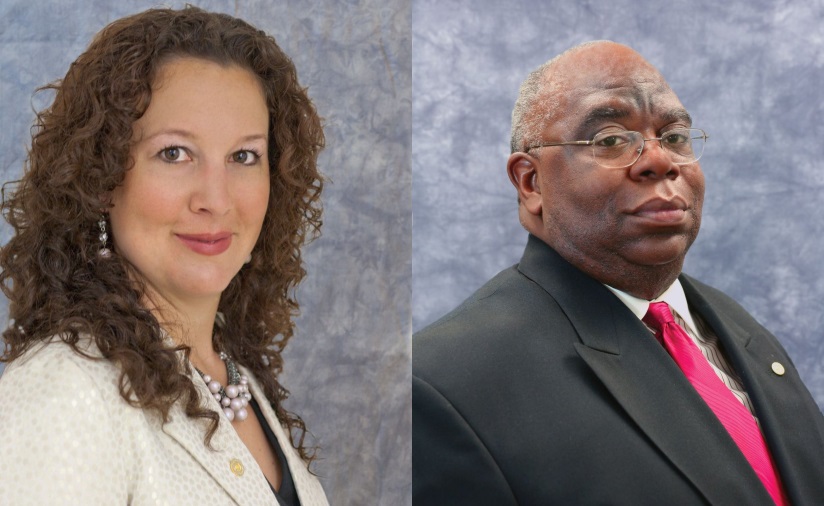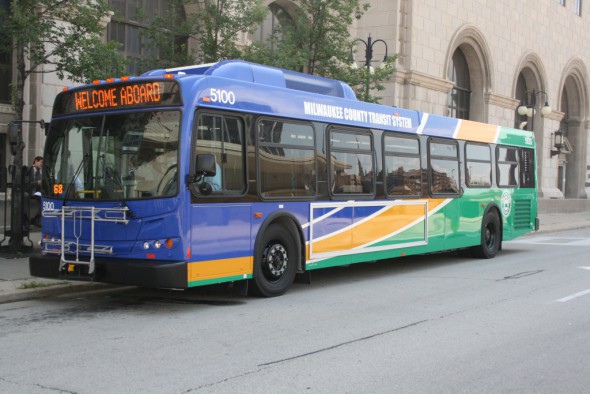How to Destroy a Transit System
County board's free bus ride program triggers huge deficits that could overwhelm system.
One day someone on the county board came up with the bright idea of giving free bus rides to senior citizens and disabled riders. Precisely whose idea it was is unclear, as so many favored it: the GO Pass Program, as it was soon dubbed, was first proposed in November 2014 and was sponsored by then Board Chair Marina Dimitrijevic, along with supervisors Jason Haas, Theo Lipscomb and Peggy Romo West, and three members no longer on the board, David Bowen, Patricia Jursik, and Gerry Broderick.
At the time senior and disabled riders were already paying only half-price for rides and there was no groundswell calling for cheaper fares. As Vi Hawkins, Chair of the Milwaukee County Commission on Aging said at a hearing on this plan: “There are many things seniors in Milwaukee County have told us they need– free bus service is not one of them.”
As Urban Milwaukee reported, members of the Commission wrote a letter to board saying “It is deeply disappointing that no one on the Milwaukee County Commission on Aging (and its committees and workgroups) was consulted about this proposal.”
Nor were any members of the County’s Department on Aging and Disability Services Division consulted regarding the idea.
Dimitrijevic, who quickly took ownership of the idea, declared it aimed to “improve the independence of older adults and people with disabilities,” but no evidence was presented to show that half-prices fares had limited anyone’s independence. And if the idea was to help people who couldn’t afford a half-price fare, then why not offer it only to low-income seniors and disabled?
Dimitrijevic also said the program was “modeled after other successful best practices,” noting that “Chicago; Pittsburgh; Jacksonville, Florida; Pittsburgh; and Providence, RI already offer free bus rides for seniors and low-income people with disabilities.”
As this short list suggests, this “best practice” was not very widespread. As a February 2015 report by the Milwaukee County Department of Transportation found, “Only five (5) of the top 35 major transit systems offer free rides for seniors.” (Milwaukee ranks 30th in ridership nationally.) “Two smaller, but similar sized transit systems (Providence, RI and Jacksonville) are also known to have such a program.”
But “there is not another major transit system that offers both free rides for seniors and persons with disabilities without an income restriction,” the report noted.
Chicago had offered free rides to both groups with no income restrictions, from 2008-2011, but added an income restriction that significantly scaled back the number of free riders after a study conducted by the University of Chicago found it cost taxpayers as much as $116 million a year. Milwaukee County Transit System managing director Dan Boehm presented the county board with a memo detailing how disastrous the program was for Chicago.
The Transit System estimated the loss of half-priced fares would cost the county some $4.2 million, yet Dimitrijevic and the board allocated just $822,600 to pay for the program, leaving a likely $3.3 million shortfall. An alarmed Milwaukee County Executive Chris Abele vetoed the proposal, but was overridden by the board. As Dimitrijevic declared, “The time is now to take the largest transit system in the state to the next level.”
It’s almost shocking how cavalierly Dimitrijevic and company proceeded, despite the fiscal warning signs. The likely $3.3 million shortfall was documented in a story by my colleague Jeramey Jannene in November 2014, long before the plan was passed. Urban Milwaukee did a follow-up story in September 2015 showing how the GO Pass system, was running up a huge deficit as predicted, and Jannene did a March 2016 story documenting how the program was bleeding the county transit system.
Meanwhile the number of free riders keeps rising. In the program’s first year, from April 15, 2015 through April 14, 2016, there were 5.3 million free rides given, and about 60 percent of them were to disabled riders. But the number has steadily grown, month by month: in April there were 629,000 free rides, which annualized would equal 7.5 million. In April free riders accounted for 21 percent of all rides, and that percent keeps rising, meaning there are fewer and fewer fares being collected and less and less revenue to support the transit system.
What’s likely happening is more and more people are getting doctors excuses claiming a disability. In Chicago, the level of fraud (for both senior and disabled riders) eventually raised costs to the point where the system was unaffordable. As free riders continue to increase, Milwaukee’s transit system will have to raise the fare for others or cut back routes or do both.
Mayo has pushed the county transit management to study what other cities have done to handle eligibility. But there are no cities to check because just two offer rides for the disabled, Chicago and Providence, and both only offer it for those who are low-income. And Providence, in the face of huge numbers of free riders, has just decided to discontinue the entire program and now charges 50 cents per ride to both seniors and the disabled.
When asked whether the rising deficit for the GO Pass program requires a new approach, Dimitrijevic had no suggestions to offer. “I’m ecstatic that so many more older adults and people with disabilities in Milwaukee County are utilizing this program and enjoying greater independence by taking public transit,” she said.
Her successor as board chair, Sup. Theo Lipscomb, who also supported the program, is considerably less ecstatic. He seemed to be seeking to blame the Abele administration for the problem. “We look forward to receiving the complete required analysis of the GO Pass per the 2016 Adopted Budget to help everyone better understand how this popular program that serves seniors and persons with disabilities in Milwaukee County impacts the transit system. I would also expect any recommendations from the administration to be included along with their more complete report.”
In short, Abele is expected to solve the problem caused by a program he opposed. And if Abele suggests ending or cutting back the program, he will be blamed for this and castigated for his heartlessness.
So the county exec, when asked about his response to the deficit, threw the ball back to the board: “Thousands of people every day use our transit system to get to work, school, doctors appointments, and more,” his spokesperson Melissa Baldauff responded. “It is precisely because transit is so important that the county executive has taken great care to ensure that any improvements and expansions are done sustainably. His opposition to the GO Pass was never about the concept, it was about the fact that the program…could lead to a large deficit in the transit budget. Unfortunately that is exactly what happened. The county executive looks forward to working with supervisors to find a solution.”
All this diplomatic ping pong would be pretty amusing, if not for the fact that we the taxpayers are paying for this increasingly unaffordable program.
More about the GO Pass Program
- Eyes on Milwaukee: Goodbye to MCTS Free Ride - Jeramey Jannene - Apr 26th, 2017
- Eyes on Milwaukee: Milwaukee County Fixes GO Pass - Jeramey Jannene - Mar 29th, 2017
- Murphy’s Law: How to Destroy a Transit System - Bruce Murphy - May 24th, 2016
- Eyes On Milwaukee: Is Free Pass Bleeding County Transit? - Jeramey Jannene - Mar 2nd, 2016
- County Free Bus-Ride Program Faces Shortfall - Graham Kilmer - Sep 28th, 2015
- Eyes on Milwaukee: Another Bad Transit Plan By County Board - Jeramey Jannene - Nov 6th, 2014
Read more about GO Pass Program here
Political Contributions Tracker
Displaying political contributions between people mentioned in this story. Learn more.
- April 30, 2019 - Marina Dimitrijevic received $100 from Jason Haas
Murphy's Law
-
Is Legislature Biased Against Working Class?
 Apr 4th, 2024 by Bruce Murphy
Apr 4th, 2024 by Bruce Murphy
-
Associated Press Will Decline in Wisconsin
 Mar 27th, 2024 by Bruce Murphy
Mar 27th, 2024 by Bruce Murphy
-
City Attorney Race Is Vitally Important
 Mar 25th, 2024 by Bruce Murphy
Mar 25th, 2024 by Bruce Murphy
Transportation
-
MPS Makes the Case for Referendum
 Mar 23rd, 2024 by Graham Kilmer
Mar 23rd, 2024 by Graham Kilmer
-
‘Fix at Six’ Group Wants I-94 Expansion Delayed For Civil Rights Report
 Mar 20th, 2024 by Jeramey Jannene
Mar 20th, 2024 by Jeramey Jannene
-
Wisconsin Has $78 Million Federal Funds For EV Charging Stations
 Mar 20th, 2024 by Erik Gunn
Mar 20th, 2024 by Erik Gunn



















Bad governance.
The County board has been and remains awful. While I have reservations of the state usurping local governance by limiting their power, I understand why it was done.The County Board is what got us Governor Walker. If they had demonstrated even a small degree of competence they may have met a very low bar of tolerablility. Instead they screw up everything, Pension scandal, Estabrook park dam fiasco. Ignorance of the Brown Deer Park shenanigans. The transit system or lack thereof sucks and now this . They are just awful.
I often wonder if these ‘gifted and talented individuals’ could successfully run a lemonade stand if given the a.) lemons, and b.) labor at no cost.
Milwaukee needs strong roads and bus system. When I was running for state senate in 1972 we endorsed that program, no Light Rail, no trolleys, just a solid bus system to get people to work, that our whole family has used, but the elitists want to waste money on trolleys, Light rail and other dumb ideas. This one is not any dumber than usual.
This group is embarassment to whole state.
Why does Dimitrijevic think elderly and disabled weren’t already riding the bus? They are not enjoying “greater” independence, they are just riding for free now and costing the County millions a year. Had she done her homework, she would know that groups like Rhode Island are laying off staff and eliminating bus routes to try to pay for this govt sanctioned give away. A mistake was made; admit it and go back to the 1/2 price model that was working for decades.
Just imagine if Abele weren’t there the kind of ridiculous shit these people would be doing.
WCD…… not true. Walker (your guy) cut but service by 25% while Exec and continues to reduce state funding for local bus systems. Please…. enough with the lies.
The way to handle fake disability claims is to tie it to Medicare. Truly disabled people are on Social Security disability which in turn qualifies them for Medicare (regardless of age).
Your list of cities with free senior transit included Pittsburgh twice; was one of them supposed to read “Philadelphia”? I think every transit system in Pennsylvania has free rides for seniors (which means it’s being imposed by people unfamiliar with specific transit systems).
Walker has his ideas, we have ours.
As noted by Tom D, the Commonwealth of Pennsylvania provides funding to all of the state’s transit systems so that seniors can ride free. The funds come from state lottery revenues.
I Hate to say it, but I’m with WCD in this…when you go around to other cities this size, they’re killing opportunities for their poor and lower paid by not having a legitimate transit system. Milwaukee has a decent bus system that could be world class by just dumping the money into it that would have been going to that cock-a-mamie trolley ride for tourists. Yeah, I get it, different piles of money…still…any move that put the system in jeopardy is the wrong move…
Dagnabbit, it worked for Jenny Fields. Giving away stuff is a sure bet to create loyalty — at least as long as the free flows free. I’m sure Pres. Sanders will fix everything.
I see people bashing Scott Walker. Scott Walker was County Executive when the county acquired the new clean burn near zero emissions buses. I remember the door coming from the stinky old buses. Thanks Scott Walker for cleaning up the pollution and providing better buses for bus riders. What liberals forget is that we have to balance budgets, not run deficits all the time.
If Dimitrijevic thinks giving away transit free to a group that hasn’t even asked for the freebie is “taking transit to the next level” then she is as ignorant as is she is arrogant.
Improving the quality of service, providing something new and innovative, or increasing ridership somehow would be taking it to the next level. Merely giving it away for free doesn’t do a darn thing to improve the system. And how “independent” will the elderly and disabled be when the whole system caves in on itself due to lack of funds? What a joke!
I guess I must have missed something. I can’t totally understand how putting people in empty seats costs the system that much more money other than what they might have had to pay for the ride, which incidentally would have to be added up at the reduced rate to see what you might have taken in. Also, who knows how much less they would have taken the bus if it was a choice between food, medicine or a ride to get out of the house. I’m sure the numbers can be added up to reflect a larger or smaller amount depend on what variables are used. On the other hand having an income restriction should not be a big deal either.
Steve, you did miss something. 5.3 million people rode for free in a year. Even if they paid half fare, MCTS would have taken in nearly $6,000,000.00. If you don’t think that’s a cost to the system I don’t know what to tell you.
You did not mention another group of volunteers who advise the County Board on transit issues, the Transit Services Advisory Committee.
The TSAC, also, was not provided an opportunity to weigh-in with our advice. I believe we would have, by resolution, advised against free rides for all seniors. We might also have advised that seniors could ride free during non-rush hours.
The thinking being that working seniors could afford the fare. Nonworking would be nudged with free rides to use buses that have available seats. Putting all seniors on all buses for free will drive up the demand to purchase more buses, hire more drivers without new revenue from riders.
All this is quite sad. I have long supported the Board’s actions in times of financial stress to maintain and try to build our bus system. There is no excuse for a policy that provides unlimited free rides for all seniors. Unneeded. Not-asked-for. Expensive. Inflating. The sooner the Board can roll it back the better.
(I do not speak for TSAC; I retired from the committee in April.)
Steve, I don’t know MCTS’ specific accounting practices, but there usually are incremental costs associated with rider counts. I am guessing that the MCTS liability insurance probably has a direct tie to the number of riders in a given year and so would other cost items, like customer service positions or security positions. A free rider costs just as much to insure as a paid rider. A free rider may call a customer service representative just as often as a paid rider.
Two or three points:
1. I wonder when enforcement of age and residency requirements became so lax. I am 69 years old and low income. When I applied for a GOPass last summer, I brought two pieces of evidence of age (my Medicare card and a current U.S. Passport) plus evidence of residence in Milwaukee County (my recently-signed apartment lease), as required. The staff member at MCTS headquarters inspected it very carefully and asked me to state my age and address two or three times. Perhaps later applicants were not held to this standard or used counterfeit documents (although it would seem to be too large an effort to produce convincing counterfeits for such a relatively modest benefit, Of course, once I got my card, my full name was given as my first and middle names (full middle name was required on the application), without my family name, so it is possible that some staff members have cognitive difficulties or have difficulty in reading.
2.To WCD I will say that sole reliance on the internal combustion engine for all transportation in Milwaukee County is foolish, wasteful, and dangerous to survival of the planet and our immediate descendants. Reliance on freeways as the sole commuting option outside the central city has led to enormous urban sprawl, especially in Waukesha and Washington County, where subdivisions built since the late 1980’s have destroyed a large portion of the state’s best farmland. A well-planned–note the adjective–fixed guideway system powered by electricity can win a large ridership and take motorists, including daily commuters, off the road, as has been the case in the Twin Cities, Denver, and even low-population-density cities such as Phoenix, Dallas, and Los Angeles. As for cost, construction light rail would not be wildly different on a per-mile with expensive and disruptive reconstruction/widening projects such as the planned widening of Interstate 94 east of 68th street and would be capable of carrying a greater passenger load. I have no idea whether the first segment of the streetcar on its own would draw a meaningful ridership–the data provided by both proponents and opponents on this point is sketchy and unconvincing. But, as the core of a well-planned–repeat, well-planned–light rail transit system–and additional phases are being considered–it might well be a good idea.
3. Would the GOPass still be a bad idea if it had been properly financed and eligibility had been more tightly controlled. I think so. I am on a very modest retirement income (all that I could afford in a life working for non-profits and with losing my job at age 63), and paying $1.10 per ride would be affordable, since I am living in subsidized housing at a low rent, although I would ride the bus less than I presently do. (NOTE: because of physical ailments, my walking radius is limited) Before I moved back to Milwaukee from Boston last year, payment of my extremely high rent left me with little discretionary income (I was also on food stamps, which, contrary to some “conservatives” did not afford me a diet of feasting), so that payment of $1.10 on a senior transit pass was a substantial expenditure, one which I had to ration very carefully and which kept me at home more than I wished. I am currently very fortunate with my low rent, but there are very many seniors, not to mention younger low-income people, who are not as fortunate as I am, for whom using public transit, even at half-price, involves sacrificing essential items (food, medicine, heat). WCD, along with the Koch Brothers, may not think that these persons have a right to live or to live decently, although that squares poorly with the Christian values which they allegedly support. Comfortably fixed people who pontificate on what poor folk, elderly or otherwise, can afford or should do, should try living on a minimum-wage job or be long-term unemployed. It would be a worthwhile revelation.
I agree with Bruce Murphy that the GOPass, with its current financial basis, apparently loose eligibility standards, and lack of income restrictions, is unwise and undermines MCTS service. But that it is generally a bad idea, even with adequate financing and proper eligibility restrictions, is a proposition that I must reject
Dennis Vlach (post 13): Scott Walker didn’t buy new buses; the federal government did (but Walker took credit). In the 9 years (2002-2010) Walker ran MCTS, 92% of MCTS capital spending (mostly bus purchases) was federal money, which couldn’t be used for any other purpose.
Since buses need replacement every 10-15 years and since Walker was in for 9 years, it isn’t surprising that much of the fleet was replaced during his reign.
As to your suggestion that Walker balanced the MCTS budget, during those 9 years, MCTS had a cumulative $975 million shortfall (operations plus capital expenses less fares and other revenue for both buses and Transit Plus). In that time, Walker cut service (bus “vehicle revenue miles”) by 21% and people left the system even faster (bus riders down 40%).
Joe: I agree that the free-for-every-senior plan is not needed. However, might its costs be overstated? Are your calculations been based on per-ride fare projections or on fares paid as part of buying passes, etc.? It would be helpful to know ratios of how fares are paid. I suspect regular riders and those on tight budgets tend to buy the passes.
My calculations are based on the article. It says ” In the program’s first year, from April 15, 2015 through April 14, 2016, there were 5.3 million free rides given.” I multiplied that by the half-price fare of $1.12.
If there is a monthly that costs even less than that, I couldn’t easily locate it. If you’d like to offer your own calculations feel free. I imagine whatever manipulations you perform, the cost will still be in the millions, something MCTS can’t be needlessly throwing around.
Peter, switch to hydrogen, propane, natural gas or electrici.
Us seniors have much higher net worth than the kids.
You can’t just multiply the number of riders by $1.10 to get potential revenue lost.
For one thing, the number of riders is NOT the number of fares. The difference is transfers and passes. If you manage to board 4 buses within a 90-minute span, you count as 4 riders, but only pay one fare ($1.75 or $1.10 for seniors) provided you use an M-Card. For $4 ($2 seniors) you can get an all-day pass.
In 2013 (latest data I have), MCTS’ actual bus fare averaged $0.9675—under 97¢ per ride. And that’s for everybody, not just seniors. This number even includes extra-fare services like Freeway Flyers or whatever zone fares were in effect back then.
Ok. Do the math then, and tell me the loss. Like i said, it’ll still be well into the millions.
@Steve: “what liberals forget is we have to balance the budgets, not run deficits all the time.” Oh my god did you actually say that? Like do you have any idea what the budgets look like under democratic control vs republican? I’ll give you a hint: exactly the opposite of what you just implied, and egregiously so! My god, look at the numbers!
Miami FL also has free rides for seniors, also I would like to know if total ridership has increased .
Post 13 D. Vlach compliments Walker on getting new buses, which was challenged by Tom D. on post 20, and rightfully so. Scott Walker was one hot mess during his stint as county exec., and almost everything he tried to force through was later rescinded, or thrown out via court cases; not to mention his criminal staff that ended up in jail. Even before I read post 20, I wanted to comment on Vlach’s reverence for Walker by reminding him that during Walkers reign, and the height of the rise in gas prices, there were only two mass trans systems in the county that lost ridership, and both were due to route cuts, and one of them was Milwaukee County because of Walker.
Our city and our planet will benefit when we ride more busses, trains, trolleys … if we can get some cars off the road in the process. Public transportation is a worthy ideal, deserving public funding. So what if some wealthy elders are riding a bus for free. While doing so, they are not threatening us with their big cars and SUV’s on our streets.
I see no reason for us seniors to ride for free. PR, Greece, Venezuela, Illinois, Ca. and other places decided to hand out freebies, dumping all the costs onto our kids, see where that took them?
WI Conservative (sic) Reactionary,
You followed post # 30 by saying you “saw no reason for us seniors to ride for free” when a reason for same was provided in post # 30: reducing the #s of seniors driving vehicles. Although elderly drivers are not statistically as dangerous as the youngest of our licensed and unlicensed drivers, anecdotal evidence suggests that clusters of elderly drivers can create dangerous driving conditions. Consider Florida or Arizona in winter. Also consider the parking lots in the new Pick ‘n Save and the new Walgreen’s in Shorewood. I have been grateful for defensive driver training in those places.
Go pass holders should meet the same requirements as those seeking a disabled parking permit.
Thomas, over extending an entire public transportation system based on your own ageism is hardly justifiable. Free rides for an entire generation because some of them are more prone to accidents does not make much sense. We would be better off requiring periodic driving tests for seniors if that is your goal.
Free bus rides because seniors are bad drivers! Ha I love it. For work I have a daily drive from the suburbs to the city and back. I stay off highways and stick to city streets. My anecdotal evidence suggests that seniors are not the problem on the roads these days. Sometimes they drive a little slower than I’d like, but the problem is that everyone is talking or texting first and driving second, something that’s true of drivers of basically every age.
Under that theory everyone should ride for free, then the cars will get off road?? No. Why should us seniors toss the costs onto the backs of our kids, that is nutty Venezuela type idea.
Milwaukee’s Problems are not the cost of Riding bus:
Crime, MPS, heroin, human trafficking, roads, abandoned homes, Milwaukee county govt a joke, outstate, poverty, unemployment, Management, corruption,taxes. What problem does this solve?
Wisconsin conservatives, you are wrong. Tom Ament was the primary cause of the pension scandal; and by the way, one of the big reasons it came about was the political infeasibility of raising taxes.
You could blame most of the County Board then for going along with Ament.
As for this, an advisory referendum passed slightly, about 52-48, to take transit off the property tax and raise the sales tax slightly to fund it. Then, even with these free rides everybody would be paying through a regressive sales tax instead of overburdening the property tax.
But both Walker and Abele resisted this tax shift because conservatives whine about every tax increase, even if the burden is spread to everybody and it therefore is less onerous.
Finally, this is what happens when you treat a legislative body without some modicum of respect. The County Board may have passed this to eventually force the shift of transit funding from property tax to sales tax.
As for light rail, it could be useful to travel greater distances with few stops, and shift some responsibility for this service away from busses, lightening the traffic congestion.